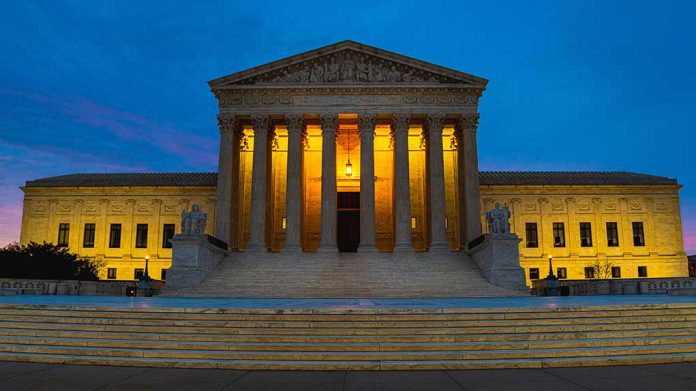
Chief Justice John Roberts has raised an urgent alarm about increasing threats undermining the independence of the judiciary, reflecting a growing concern among many Americans observing the political landscape today.
At a Glance
- Roberts emphasizes threats against judges as a significant concern.
- Roberts criticizes political interference and intimidation.
- Hostile threats against judges have seen a sharp increase.
- Roberts refrains from addressing current ethical concerns.
Growing Threats to the Judiciary
Chief Justice Roberts highlighted potentially dangerous trends, including violence and intimidation aimed at judges. His recent report raised eyebrows by describing judicial independence as under “grave threat.” Startling statistics show more than 1,000 serious threats to judges investigated over the past five years, exemplifying the dire circumstances faced by those upholding the law. This presents a challenge to maintaining a fair and impartial judicial system, which is crucial for democracy.
Among the alarming developments, Justice Amy Coney Barrett has had to wear a bulletproof vest for safety reasons, emphasizing how critical the security situation has become. Chief Justice Roberts’ concerns extend to the inappropriate public dissemination of personal information regarding judges, which harassers can exploit.
Political Interference and Its Implications
Roberts openly criticized political figures for attempting to sway judicial proceedings, warning that such behavior endangers the foundational principle of the rule of law. The arrest of an individual threatening Justice Brett Kavanaugh underscores the lethal potential of political interference. Furthermore, public officials’ remarks suggesting partisan bias in judicial rulings have undeniable repercussions on views regarding judiciary impartiality.
“Public officials certainly have a right to criticize the work of the judiciary, but they should be mindful that intemperance in their statements when it comes to judges may prompt dangerous reactions by others.” – Chief Justice John Roberts
Despite the mounting ethical dilemmas and proposals for reform, such as implementing Supreme Court term limits, Roberts remained focused on reinforcing judicial independence over engaging in debates about potential changes or addressing the court’s own ethical challenges.
US Supreme Court Chief Justice John Roberts warned about a rising number of threats to the judiciary's independence, including calls for violence against judges and 'dangerous' suggestions by elected officials to disregard court rulings they disagree with https://t.co/sQSSdiriRa pic.twitter.com/Em5YSp6KNK
— Reuters Legal (@ReutersLegal) January 1, 2025
Public Trust and Judicial Integrity
The Supreme Court’s credibility is under scrutiny, highlighted by contentious decisions and perceived ethical lapses. Public confidence is dwindling, with influential voices, such as President Joe Biden, calling for structural adjustments to restore trust in the judiciary. Efforts by Senate Democrats to engage Roberts on ethics concerns have been met with reluctance, further inflaming debates about transparency and accountability within the highest court.
As Roberts emphasized the essential nature of criticism, he denoted that “extremism is undermining the public’s confidence” in judicial decisions, necessitating a balanced approach to safeguard judicial independence while addressing public concerns through legislative or procedural measures.
Sources:
- Supreme Court Chief Justice John Roberts: Courts’ independence under threat from violence
- Chief Justice Roberts Condemns Threats to Judicial Independence
- Chief justice Roberts warns intimidation and violence risk judicial independence




